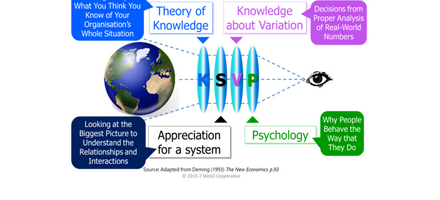
Leadership – it’s about people
Progress indicator

In the final part of this four-part series on Deming’s System of Profound Knowledge, Alan Clark and Tony Korycki explain how organisations should encourage leadership as a crucial attribute to their business success.
“‘If it weren't for the people, the god-damn people’ said Finnerty, ‘always getting tangled up in the machinery. If it weren't for them, the world would be an engineer's paradise.’”
Kurt Vonnegut, Player Piano
Unfortunately, far too many managers seem to hold a poor attitude towards the people in their organisation, when in fact given the opportunity and especially proper leadership, people are the source of competitive advantage and long-term success. True leadership releases the creative potential and contribution of people in any organisation. This applies to your team, yourself, your bosses, colleagues or even others with whom you have no formal organisational relationship.
This final article focuses on leadership. Psychology, the fourth field in W. Edwards Deming’s System of Profound Knowledge (SoPK) is a massive one. Leadership is, however, the key to unlocking the potential of people in every organisation and so naturally presents itself as a subject extremely worthy of exploration.
Whilst Deming is known for his work in analysis of data, he also gave special attention to people, whether leaders or workers, as shown by his 14 Points for Managers in Out of the Crisis. He made a strong point on leadership:
Point 7. Institute leadership. The aim of supervision should be to help people and machines and gadgets to do a better job. Supervision of management is in need of overhaul, as well as supervision of [production] workers.
In the 1980s Deming highlighted the need for responsibility to be taken for everybody doing a better job. This need is still with us in the 21st century. For example, research by the Shingo Prize Institute in 2014 showed that the performance of 95% of organisations undertaking Lean either flatlined, reverted to their original performance or worse. The key was ongoing leadership.
There is no such thing as a born leader. Leadership is a skilled craft that is learnt through your interactions with others. People identified as natural leaders have been fortunate enough to have life experiences that enabled them to develop their capabilities and hone their interpersonal attributes, sometimes without knowing it. Everyone should be encouraged that they too can become an effective leader. Might the following powerful quote support this?
“Given the right circumstances, from no more than dreams, determination, and the liberty to try, quite ordinary people consistently do extraordinary things.”
Dee Hock, One from Many: VISA and the Rise of Chaordic Organization (2005)
Dee Hock was one of the most successful leaders you may never have heard of. His leadership turned a mess that was the BankAmericard credit card in the late 1960s, into Visa International in the early 1970s. You may have heard of them and I think you would agree that the creation of Visa from a mess was indeed an extraordinary thing.
One episode early in his experience with credit cards exemplifies Hock’s effectiveness as a leader, even though not in a senior position at the time. It concerns his leadership of a project at the local bank he worked for to mail out BankAmericards to their customers in the late 1960s. There was an extremely tight time schedule and he worked in an inspiring, collaborative and engaging way that enabled cards to go out on time. Such was the inspiration and engagement that Hock generated, people worked unsocial hours and even some bank directors volunteered to help.
One Hock quotation seems to be fundamental to what he saw at the heart of leadership:
“Hire and promote first on the basis of integrity; second, motivation; third, capacity; fourth, understanding; fifth, knowledge; and last and least, experience.”
Integrity, building respect and trust is not only critical in hiring and promoting – it is the foundation for leadership, especially if the aim is sustainable success rather than short-term gains, whether financial, ego or power. The keys to integrity are your values and behaving to them consistently.
Having recognised the power of building an environment of respect and trust, what else? A leader’s primary job is facilitating the formation of an inspirational vision of a better, possibly ideal, future – for example, Martin Luther King’s famous ‘I have a dream’ speech. Occasionally, it is the leader that will be able to ‘see’ the vision. More powerfully and usually richer is when as many others as possible are involved. When in doubt, start with a dream. Yes you make it up! Then you need to refine it.
Leaders are then responsible for developing a strategy to move towards the vision. Ross Brawn OBE, has a track record as a highly successful Designer, Technical Director and Formula One Managing Director of Motorsports. His book Total Competition: Lessons in strategy from Formula One is very worthwhile reading. He writes that, “luck is preparation waiting for opportunity”, and that effective strategy must be a system of processes that are constantly worked on. A completely different approach to so many organisations that after creating, and perhaps sharing a strategic plan will file it without ceremony until next year.
Critically Brawn’s book states that strategy must be comprehensive. Successful strategy must include economic, technical and political factors. History is littered with strategic failures that did not consider politics. This applies to strategy in sport, business, the arts, social change, and war.
Organisations are the people in them. There are many aspects of psychology that can help organisations understand what is happening and be sustainably successful. Key amongst those is leadership at every level, and potentially in all directions. This releases the personal qualities, creativity and ingenuity of people in all organisations that deliver sustainable success.
Effective leaders respect others and build trust. They work to understand the whole situation in order to facilitate the creation of an inspiring vision and a strategy to achieve it.
Leadership at every level of an organisation is key to all other aspects of psychology. Critically, leadership starts with everyone taking responsibility. It is also the key to accessing and maximising the benefits of the other three fields of knowledge that make Deming’s SoPK.
About the authors: Alan Clark, CQP FCQI, is a Management Development Coach, Adviser and Trainer at Key Business Improvement. Tony Korycki, BA, MSc, is a Service Introduction and Process Architect at BT Global Services.
Quality World

Get the latest news, interviews and features on quality in our industry leading magazine.


